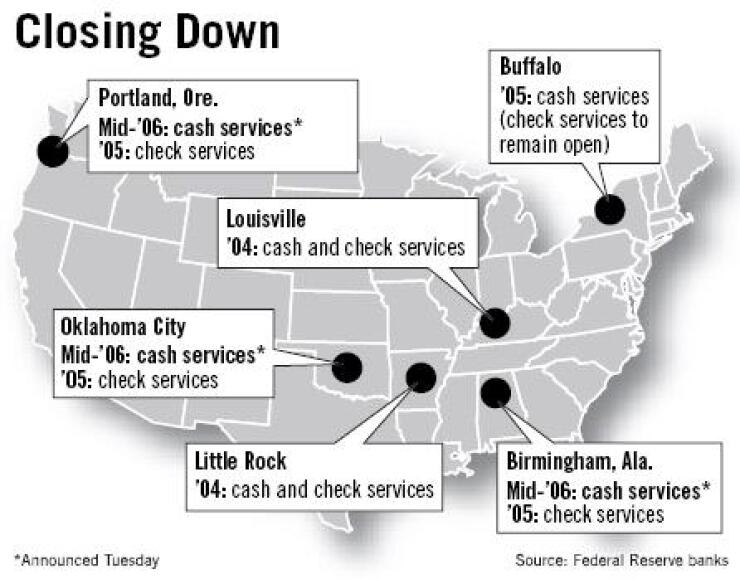
As the Federal Reserve banks shutter check-processing centers around the country, they also are closing some of the vaults where they provide cash services to banks and credit unions.
The Fed announced Tuesday that it plans to stop offering cash services at its branches in Birmingham, Ala.; Oklahoma City; and Portland, Ore. Instead of operating cash vaults in those cities, it will hire armored cars to carry the currency to Fed sites in Atlanta, Dallas, and Seattle in an arrangement that it calls "cash depots."
The closings, to take effect over the next six to 12 months, are the second such round for cash-services centers. In 2004 and early 2005 the Fed discontinued cash services at its branches in Little Rock, Louisville, and Buffalo and established cash depot arrangements in those cities.
In all of the cases except Buffalo, the cash services offices are in cities where the Fed is shutting down its check-processing operations or has already done so. The Fed has said that the Buffalo site will continue to offer check processing.
Demand for the Fed's check-processing services is gradually declining because consumers have been shifting to other payment systems, such as automated clearing houses and debit cards. In addition, banks are starting to convert paper checks into digital image files and settling the payments electronically.
The use of cash, by contrast, is growing. The Fed says the dollar value of U.S. currency in circulation worldwide increased almost 88% in the decade from 1994 to 2004, to $720 billion. It says its deposits and order processing grew nearly 70% in the same period, to 75 billion banknotes.
Under the current system, banks must pay for the courier service to transport cash to the Fed branch. Mark L. Mullinix, the executive vice president of the Fed's national cash product office, said that with cash depots, the Fed will bear the cost of running the armored trucks to the more distant centers and not pass on the cost to the institutions.
"They're not incurring the additional expense of this depot program," he said.
Kathleen Milner, a senior vice president at Union Bank of California, which is mostly owned by Mitsubishi Tokyo Financial Group Inc., said the closings would not prove a hardship to banks.The Fed's coin services have relied on depot arrangements for some time with no problems for institutions, Ms. Milner said. Doing the same for cash is "just a means of making it more cost-effective to deliver this service."
Ms. Milner also serves on a Fed advisory panel for cash services.
Bert Ely, an analyst in Alexandria, Va., said the decline of checks clearly influenced this decision. He noted that Fed branches typically have only a few functions, including check processing, cash services, and housing bank examiners.
Examiners can work out of ordinary office buildings with no special security requirements, he said, so when check-processing operations shut down, "it loads too much overhead on the currency-handling side of it."
But Mr. Mullinix downplayed any connection between the check-center closings and the cash operations. "That's not how we've approached this project," he said.
The Fed is taking other steps to reduce cash shipments, he said, such as letting banks transfer the value of the currency to the Fed's books while keeping the paper money in their own vaults. Such "custodial inventory" would enable the banks to use the assets to meet reserve requirements or to make overnight loans.
Mr. Mullinix said the Fed has undertaken 11 pilot tests of the custodial inventory program. It plans to issue a final policy this year, he said; that policy could take effect in 2006.
In 2003 the Fed proposed charging a fee to banks that ordered new cash within five days of making a deposit. The proposal drew objections from the banks.





